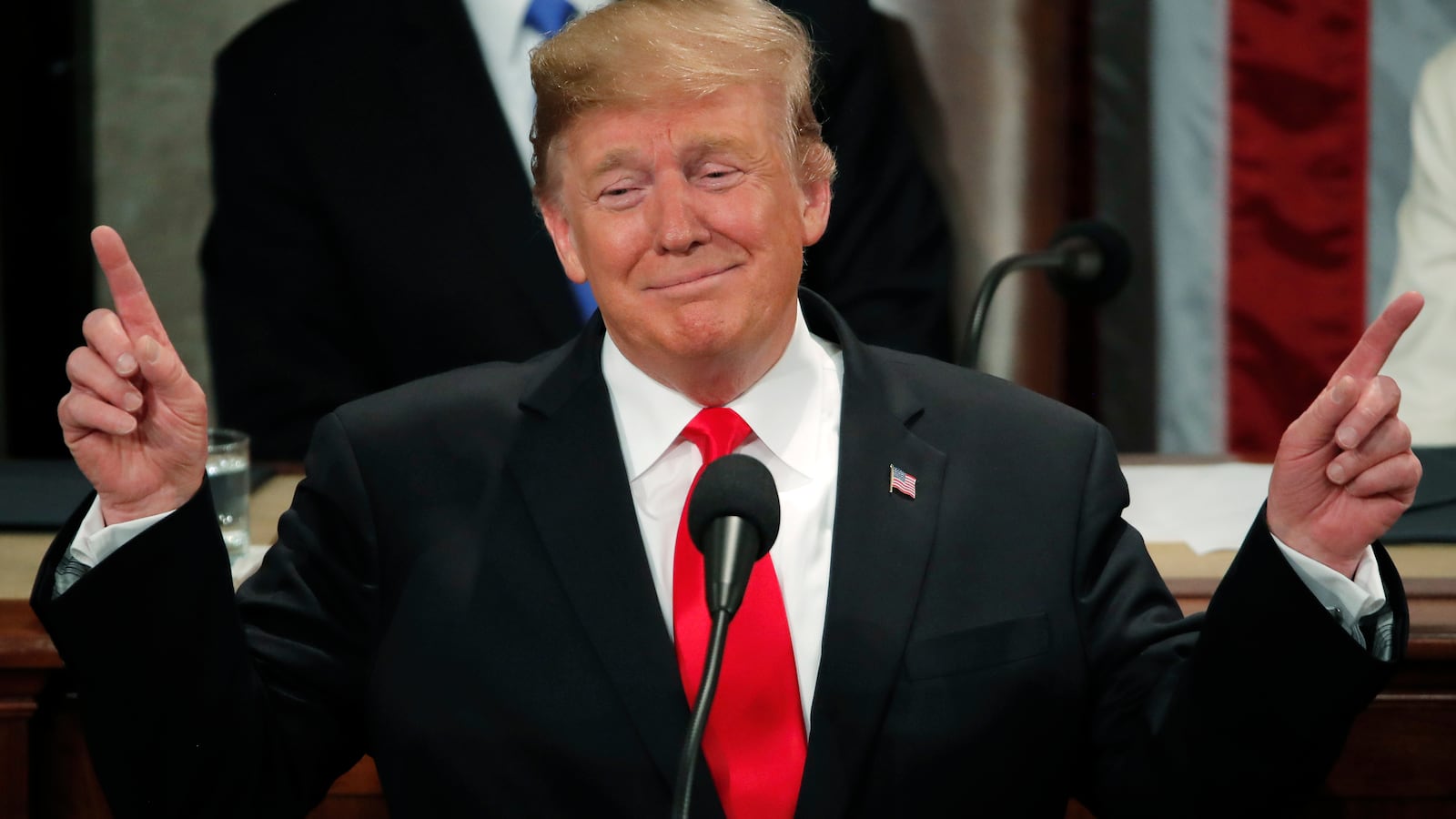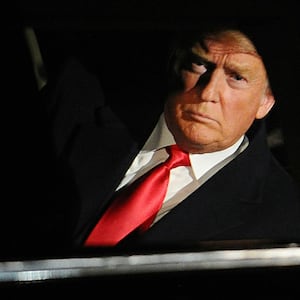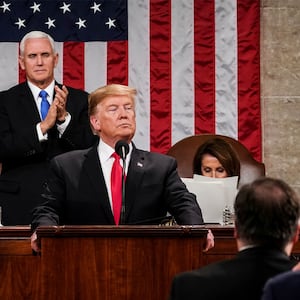President Trump’s State of the Union on Tuesday night was surprising. Of course, there was the expected call for bipartisanship—the calling card of he who has lost control of Congress. And there was the unsurprising harping on the ills of abortion and the usual ugly language about the dangers posed by immigrants.
But laced into the fear-mongering and the heightening of culture war touchstones was another Trump, a Trump who had been moved by human suffering, or at least, who wished to convey that to his audience. This Trump emerged when he addressed the guests he had invited to the SOTU.
For instead of inviting the families of people killed by undocumented people, or the women who accused Bill Clinton of sexually assaulting them, Trump’s guests on Tuesday night were formerly incarcerated people; they were Holocaust survivors and Pittsburgh survivors and the U.S. soldiers and police officers who had rescued them.
And when Trump addressed these people, in between references to unborn children and MS13 members, he was suddenly human.
It started when the President introduced Alice Johnson, an African American woman who had been sentenced to life in prison in 1977 as a first-time non-violent drug offender. As the President correctly noted, “Alice’s story underscores the disparities and unfairness that can exist in criminal sentencing — and the need to remedy this total injustice.”
At the behest of fellow reality TV star Kim Kardashian West and his son-in-law Jared Kushner, Trump commuted Johnson’s sentence in June. “When I saw Alice's beautiful family greet her at the prison gates, hugging and kissing and crying and laughing, I knew I did something right,” he said. He thanked Johnson for being an inspiration to him.
And then the entire United States government gave a thunderous applause to a formerly incarcerated person.
This simple act of humanizing a person who has fallen prey to our unjust criminal justice system, of applauding her and even thanking her, is as they say a BFD. There are people languishing in prisons for things that are no longer crimes, or should no longer be crimes, people sentenced under racist minimum sentencing laws to serve the beast of mass incarceration. There are people in prison for crimes they did not comment, and people in prison because they couldn’t make bail.
Even when released, the formerly incarcerated face a huge stigma, which makes it sometimes impossible for them to find work and get back on track.
To have the President of the United States say that the criminal justice system has failed Americans in a State of the Union Address was an epic moment in American history.
Trump invited not one but two formerly incarcerated people, and each got a long, standing ovation from senators and House members of both parties. The second, Matthew Charles, has just been released thanks to Trump’s shocking bipartisan criminal justice package, the First Step Act, a huge accomplishment in an area that has stymied legislators for decades.
The dichotomy between Trump’s rhetoric and his personal addresses was even more apparent when he started talking about Jews. Trump described how he withdrew the U.S. from the Iran nuclear deal, which he chalked up to his commitment not to “avert our eyes from a regime that chants ‘death to America’ and threatens genocide against the Jewish people.” He pledged to “never ignore the vile poison of anti-Semitism,” and then pivoted to the massacre of 11 Jews in the Tree of Life Synagogue in Pittsburgh.
The pivot was dizzying. Many American Jews supported the Iran deal, and even more disapprove of Trump’s scuttling the deal. The Iran deal was famously the bête noir of Israeli Prime Minister Benjamin Netanyahu, and that slippage—from the Tree of Life shooter, whose target was liberal, immigrant-friendly American Jews, to the enemies of the Jewish state like Iran and Hamas—was the approach favored by Israelis like Ambassador Ron Dermer and Knesset member Naftali Bennett, who appropriated the tragedy for a platform they are more comfortable with.
Indeed, Trump seems to have replaced the liberal American Jewish community, which by and large hates him, with the hawkish Israeli one that loves him; at a Hanukah party this year, he called Israel “your country” to a roomful of American Jews.
Even worse, most American Jews felt that Trump himself was at least somewhat responsible for the Tree of Life massacre. It is his own rhetoric against immigrants that Robert Bowers, the murderer, had reiterated and then amplified on the racist social media platform Gab.
Bowers’ only problem with Trump was that he didn’t go far enough. And many Jews felt that the President’s hate-mongering against a caravan of immigrants in the run up to the midterms was what set Bowers off; Bowers himself credited the caravan as the reason behind his attack.
So for many Jews watching the State of the Union, Trump’s words rang false. And yet, when Trump turned to the guests he had brought, a different person emerged. He made Timothy Matson, a Pittsburgh SWAT officer who ran into the line of fire to capture Bowers and who has just had his 12th surgery, stand for three ovations.
“Officer Matson, please,” Trump said. “Thank you. We are forever grateful.”
He also invited Judah Samet, a Holocaust survivor who missed the synagogue massacre by just minutes. And Trump told a moving story about Samet.
“Judah says he can still remember the exact moment, nearly 75 years ago, after 10 months in a concentration camp, when he and his family were put on a train, and told they were going to another camp,” he said. “Suddenly the train screeched to a very strong halt. A soldier appeared. Judah’s family braced for the worst. Then, his father cried out with joy: ‘It’s the Americans. It’s the Americans.’”
Trump also invited another Holocaust survivor, Joshua Kaufman, and a soldier who had liberated Dachau, where Kaufman had been a prisoner. “To me,” the President quoted Kaufman as saying, “the American soldiers were proof that God exists, and they came down from the sky. They came down from heaven.”
It’s interesting that Trump views the fight against anti-Semitism as happening at the hands of U.S. law enforcement and soldiers, and Jews as victims in need of rescuing. And yet, these men who have saved Jewish lives are undoubtedly heroes, and do deserve our praise, our applause, and our deep gratitude.
Some saw this as political theater; no doubt, it was. And no theatrical performance can overshadow Trump’s rhetoric and actions. Trump’s racist messaging is undeniable. His war against Colin Kaepernick and others who oppose police brutality surely outweighs two minutes of criminal justice work.
And though he may talk about fighting anti-Semitism, he had to be begged to use the word in the wake of the Pittsburgh shooting. And all that is to say nothing of hiring Sebastian Gorka, who belongs to a Nazi-affiliated party, and Steve Bannon, who gave the anti-Semitic alt-right movement a home at Breitbart, to work at the White House. And of course, who could forget the time he called neo-Nazis “fine people”?
But at the same time, the vast majority of Trump is theater. There’s no wall. There’s no repeal of Obamacare. Hillary Clinton has not been locked up.
And last night, interspersed within the usual bait for the MAGA crowd, was a little bit of theater for me.








